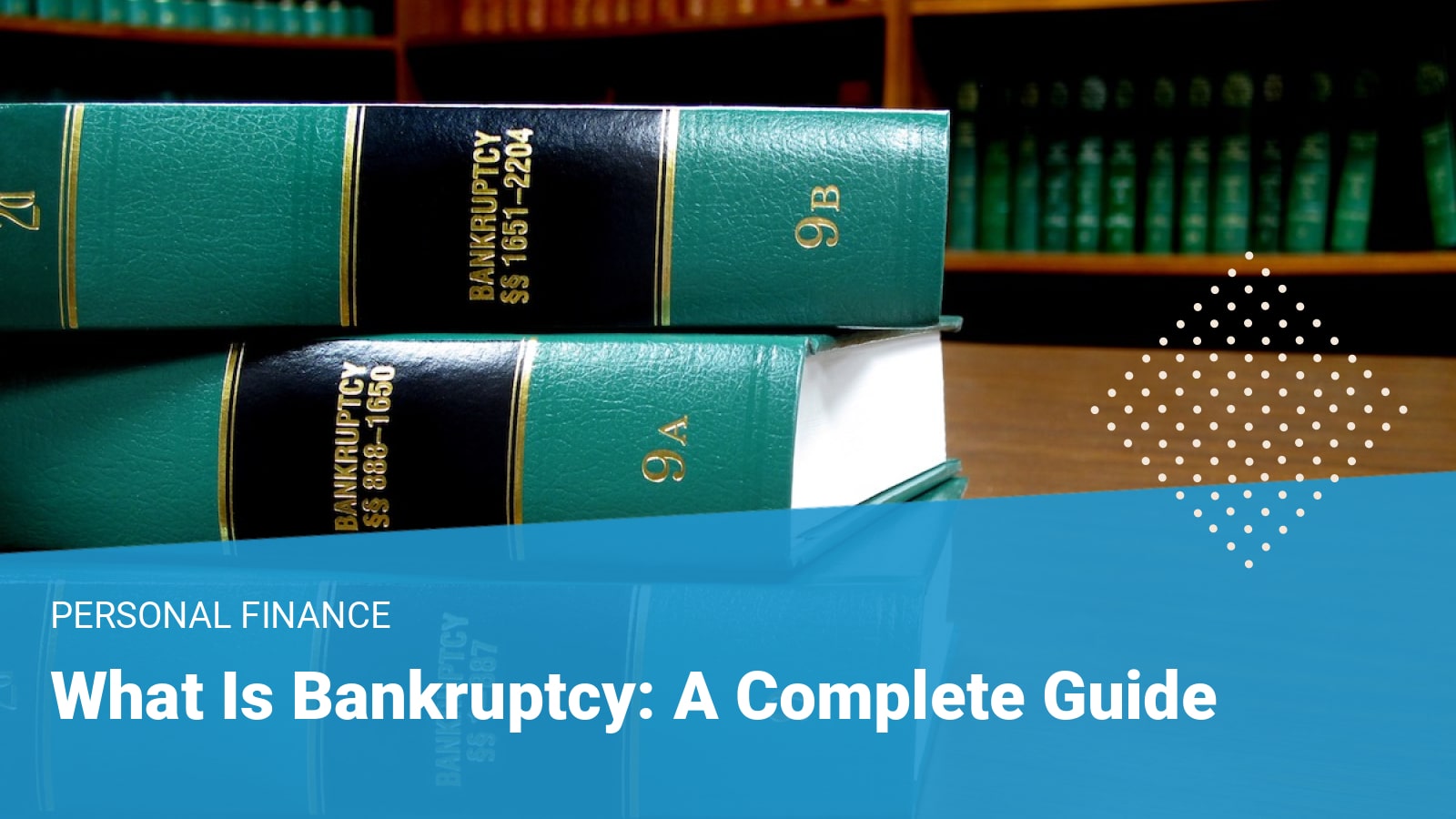What is Bankruptcy?
Bankruptcy is the very last resort for people drowning in debt.
Bankruptcy is a court proceeding in which a person or company requests to be relieved of their debts and liabilities so that they are no longer legally required to pay them.
You should know what to expect before you consider filing for bankruptcy. In this guide, you’ll learn about the different types of bankruptcy and how to apply.
The bankruptcy process begins with the debtor submitting a petition, which is most common, or on behalf of the creditors, which is less frequent.
All the debtor’s assets are measured and assessed and the assets can be used to pay off part of the outstanding debt.
The judge and court trustee will first examine the assets and liabilities of an individual to determine if he truly cannot pay his bills.
Bankruptcy laws were introduced to give a second chance to people whose finances have, for one reason or another, collapsed. Most of the time, such requests are granted.
Related: 5 Effective tips to get rid of debt
Who Declares Bankruptcy?
People who are bankrupt have far more debts than cash to cover them and have no hope of recovering from the situation. One would think that businesses seek help more often than individuals, but it is the opposite.
Most individuals who declare bankruptcy have one or more financial obligations, such as real estate holdings, mortgage, auto loans, and student loans that are too much for them to cover.
If the person has no income to pay for these obligations, he would have to apply for one of the main two types of bankruptcy.
> Read about the main types of bankruptcy.
According to a 2015 study, there were 844,495 bankruptcy cases filed and 97% of them were filed by individuals. The number of cases has dropped in the years since but not significantly.
While bankruptcy may seem like a relief, it’s important to understand that it adversely affects one’s credit score and future ability to spend money.
It may prevent extreme legal actions by creditors such as home disclosure or wage garnishment, but there is quite a high price to pay.
Mortgage debt, credit card bills, and personal loans might overwhelm you, prompting the need to file a bankruptcy case.
If based on your calculations, you conclude that it will take more than five years to pay off all your debts, it may be advisable to file for bankruptcy.
What Happens to Your Credit When You File for Bankruptcy?
How will bankruptcy affect you and your credit? For starters, it can affect your credit score more acutely than any other single financial event.
While not all bankruptcies cause your credit score to drop significantly – in fact, it’s theoretically possible that your creditworthiness could increase after bankruptcy – any negative impact makes it more difficult to obtain credit in the future.
Filing for bankruptcy may have negative long-term effects, as it appears on your credit report for years, providing a big warning to potential lenders about your troubled payment history.
Some creditors will reject an application immediately when bankruptcy is mentioned on your credit report.
Types of Bankruptcy
These are the two main types of consumer bankruptcy:
- Chapter 7
- Chapter 13
In addition, Chapter 11 bankruptcy is mostly used by businesses and involves a process that requires court approval.
Chapter 7 Bankruptcy
Under Chapter 7 bankruptcy, you can have all or part of your debts relieved after the sale of your liquid assets.
Liquid assets are assets that can be easily converted into cash.
Some of these liquid assets may be distributed among your creditors as repayment and any remaining debt is discharged.
How to qualify for Chapter 7 bankruptcy:
- Pass a means test to prove your income is less than the average state income for an individual;
- Receive credit counseling via telephone or online, within 180 days, from an approved agency listed on the United States Courts website;
- File the petition through a bankruptcy lawyer. Representing yourself is not recommended as the risk of losing is quite high. Most individuals do not fully understand federal bankruptcy laws and a professional can help you understand which laws apply to your specific case;
- If you fail the means test for Chapter 7, you can apply for Chapter 13.
Chapter 13 Bankruptcy
These petitions make up about 30% of non-business bankruptcy filings. It involves paying off some of your debts and being forgiven for the rest.
Chapter 13 bankruptcy mainly applies to people who have a significantly high income and do not wish to give up their property.
The total debts of people who apply for Chapter 13 bankruptcy should not exceed a certain amount. This amount varies and is reevaluated periodically. Check with a bankruptcy attorney first.
Under Chapter 13, you will be put on a three to five-year plan to repay part or all of your debt. You will submit this repayment plan to the court after which you should begin making payments to the court.
It might be confusing and overwhelming to choose between these two main types of bankruptcy. If you have secured debt, such as a car loan, that you want to continue paying, you might want to choose to file Chapter 13.
If you prefer keeping these assets, Chapter 7 might be the best option for you.
Chapter 11 Bankruptcy
Chapter 11 is designed for businesses and gives them a chance to reopen as it restructures a business’s debts and assets.
The main aim of this process is to aid businesses in paying their creditors back. It has been used by large corporations like General Motors and United Airlines.
Although individuals and married couples can file for Chapter 11 bankruptcy, it isn’t normally an option for personal bankruptcy.
The court filing fee for a Chapter 11 application is already more than $1,700 and attorney fees are typically $15,000 or more.
A Chapter 11 bankruptcy will only make sense for high-income earners or business owners who can’t file for Chapter 13 due to having too much debt.
Other Types of Bankruptcies
As mentioned above, the main types of bankruptcy are Chapters 7, 11, and 13. Let’s tackle a few others which aren’t as popular.
Chapter 9
Chapter 9 bankruptcy applies to cities or towns where an industry closes and employees have to work elsewhere. This protects municipalities from their creditors as it rearranges their affairs to have a repayment plan.
Chapter 12
Chapter 12 bankruptcy applies to “family fishermen” and “family farmers.” Debts should not exceed approximately $11 million for farmers and $2.2 million for fishermen.
You need to receive a steady annual income in these respective occupations to qualify for this type of bankruptcy.
Chapter 15
Chapter 15 bankruptcy is applicable in a case where a debtor has assets and debts in the United States and other countries. The U.S court’s power is only limited to the assets a person has in the United States.
Filing for Bankruptcy
The moment you are declared bankrupt, creditors may not collect their debts from you, are unable to seize assets, and may not make withdrawals from your bank.
💡 Note: The filing process isn’t free. Attorney and filing fees are involved.
Once you file for bankruptcy, you may see a significant drop in your credit score. Individuals with a high credit score may even see it drop by more than 100 points.
Also keep in mind that Chapter 7 bankruptcy will stay on your credit report for 10 years and Chapter 13, for seven years.
A lot of people assume bankruptcy automatically wipes out all your debts. However, there are a few non-dischargeable debts:
- Tax debts
- Debts for some fines and penalties
- Student loans
- Alimony and child support
- Debts for personal injury or death caused by drunk driving
- Alimony
- Child support
Factors to Consider When Filing for Bankruptcy
Bankruptcy is not an option for everyone. Carefully weigh your situation and see if you can fix your financial woes and avoid filing for bankruptcy.
There are many consequences to think about. For instance, if you are having difficulty paying your mortgage, you may decide to file for Chapter 7 bankruptcy and have some of your debts forgiven.
💡 Note: Since this option allows for the sale of your liquid assets, you might lose valuable property, such as your own house.
High-income earners are eligible to file for Chapter 13 and they may include mortgage payments on their repayment plan.
Ensure your pension plans are safe. Most state laws will provide protection for pension plans and life insurance before a bankruptcy proceeding.
The Bankruptcy Means Test
The main objective of the bankruptcy means test is to assess whether a debtor truly qualifies for bankruptcy under Chapter 7.
The test is not applicable to disabled veterans who accumulated debt while active on duty. If a filer’s debt is a result of operating a business, he may file for Chapter 7.
The first step in the bankruptcy means test is to compare the debtor’s average income from the past six months. The debtor is eligible to file for Chapter 7 if his income is less than the State’s median family income.
A debtor may pass this means test but still be advised by a bankruptcy trustee to use his income in repaying creditors in a Chapter 13 repayment plan.
The income calculation will include:
- Interest, dividends, and royalties
- Wages, salary, tips, business earnings, overtime hours, and commissions
- Rental and real property income
- Gross income from a business, farm, or profession
- Annuity compensation
- Worker’s compensation
- Regular child support
The second step is when a debtor makes more than the median state’s income.
This second part of the means test will determine his eligibility for Chapter 7 bankruptcy. If his total disposable income is enough to pay part of his creditor’s debt, he is eligible for a Chapter 13 repayment plan.
As you can gather from this guide, there are many factors you need to weigh and consider before filing for bankruptcy.
The best option would be to make an appointment with a bankruptcy attorney for professional and tailor-made advice for your specific situation.
Do You Need An Attorney?
Bankruptcy is a very complicated process. While you can file for bankruptcy on your own, especially for Chapter 7 filing, it’s best to work with an attorney.
A bankruptcy attorney may put you in a better negotiation position as your creditors will probably also have legal representation.
Plus, you can benefit from sound legal advice to help you make informed decisions when it comes to handling your bankruptcy process.
Bankruptcy FAQs
What is a Chapter 7 bankruptcy?
Chapter 7 bankruptcy is often the easiest choice for consumers struggling with debt, and wanting to make a fresh start. To qualify for Chapter 7 you must show a court that your regular income is not sufficient to pay even a portion of your debt and this forms part of the bankruptcy means test.
What is a Chapter 13 bankruptcy?
Chapter 13 bankruptcy is the most common choice for individuals. To successfully file for Chapter 13 your secured and unsecured debt, including all loans, should not exceed a certain amount. Some people file for Chapter 13 if they earn too much to qualify for Chapter 7.
What is Chapter 11 bankruptcy?
Chapter 11 bankruptcy is aimed at businesses that need to restructure to continue operations. This is different from Chapter 7, which is aimed at businesses that are in the process of shutting down. Chapter 11 gives businesses the opportunity to propose a payment plan for their debt.
What is the downside of filing for bankruptcy?
There are pros and cons to bankruptcy. Here are a few downsides to a Chapter 7 bankruptcy:
- The court’s docket is open to the public so people looking for this information can find it.
- You need to pass the means test to qualify for Chapter 7.
- Some items that are not covered by the exemption can be sold (liquidated) by the trustee, which means you may need to give up some luxury items.
- You may need to start rebuilding your credit score again.
What is bankruptcy fraud?
Bankruptcy fraud can result in serious consequences such as a fine or a criminal conviction. Some ways in which people are dishonest when filing for bankruptcy include:
- Obtaining credit under false pretenses.
- Falsifying financial documents.
- Engaging in deceptive business practices.
- Purchase items on credit with no intention of paying the debt.
- Paying someone to hide debt from the court.
- Failing to list an asset to prevent it from being sold.
Sources
- Journal of Accountancyaccessed on February 13, 2023





